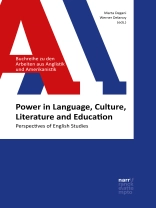In one of the contributions to this edited volume an interviewee argues that 'English is power’. For researchers in the field of English Studies this raises the questions of where the power of English resides and which types and practices of power are implied in the uses of English. Linguists, scholars of literature and culture, and language educators address aspects of these questions in a wide range of contributions. The book shows that the power of English can oscillate between empowerment and subjection, on the one hand enabling humans to develop manifold capabilities and on the other constraining their scope of action and reflection. In this edited volume, a case is made for self-critical English Studies to be dialogic, empowering and power-critical in approach.
Spis treści
Part 1: The perspectives of English linguistics
1.1. Alexander Onysko: Power to the Englishes? Reflections on the notion of equality among world Englishes
1.2. Eva Graf, Frédérick Dionne and Melanie Fleischhacker: The power of questioning practices in coaching – insights from linguistic and interdisciplinary research
1.3.Marta Degani: Linguistic approaches to populism in politics: current developments in English Studies
1.4.Christopher Blake Shedd: The power of Martin Luther King: A linguistic analysis
1.5. Vesna Lazovic: 'Wherever you go, your bank travels with you’: Personification in British and Serbian online bank advertisements
1.6.Nikola Dobric & Günther Sigott: Use of error profiles in applied linguistics: Cataloguing rating-negative performance at the English Department, University of Klagenfurt, Austria
2.Part 2: The perspectives of English literature and culture
2.1.Alexa Weik von Mossner: The power of love: The Silver Linings Playbook as Romantic Neuronovel
2.2.Marijana Mikic: The consequences and possibilities of grief in Sherri L. Smith’s Orleans: Environmental injustice and black female power
2.3.Carina Rasse: Feeling for others: Environmental justice, emotion, and moral imagination in Linda Hogan’s Solar Storms
2.4.Matthias Klestil: Unveiling subjection, practicing subjectivation: Race, power, and strategies of rewriting the self in Charles W. Chestnutt’s The Marrow of Tradition
2.5.Iris van der Horst: 'I am husband now in Master Frankford’s place’: Abuse of power in the main plot of Thomas Heywood’s A Woman Killed with Kindness
2.6.Ursula Posratschnig: The story of meat
2.7.Armin Lippitz, René Reinhold Schallegger & Felix Schniz: Disempowering the controller: Videogames and the metanarrative of agency
3.Part 3: The perspectives of English language education
3.1.Werner Delanoy: The power of literature (teaching): Experiencing Warsan Shire’s Home
3.2.Anita Millonig: Post-inclusive education, diversity and mulitlinguality in ELT
3.3.Carmen M. Amerstorfer & Clara Kuncic: The power within: The motivation, interest, and engagement of students in problem-based preservice teacher education
3.4.Ursula Posratschnig & Günther Sigott: Teaching academic writing to undergraduate students of English in Klagenfurt: From the word to the world
3.5.Irena Vodopija-Krstanovic: Understanding EMI teacher empowerment: What does it mean and how can it be enhanced?
O autorze
Marta Degani was appointed Associate Professor in English Linguistics at the University of Verona, Italy, in 2014 and currently also holds a position as Senior Scientist of English Linguistics at the University of Klagenfurt, Austria. Her current research focuses on the analysis of political discourse in the frameworks of cognitive semantics and critical discourse analysis, and the study of varieties of English and language contact in the context of Aotearoa New Zealand.
Werner Delanoy is professor of English language education in the English Department at the University of Klagenfurt. His main areas of research are inter- and transcultural learning perspectives, cosmopolitanism and global citizenship education, English language education in a globalized modernity and contemporary British culture and literature.












